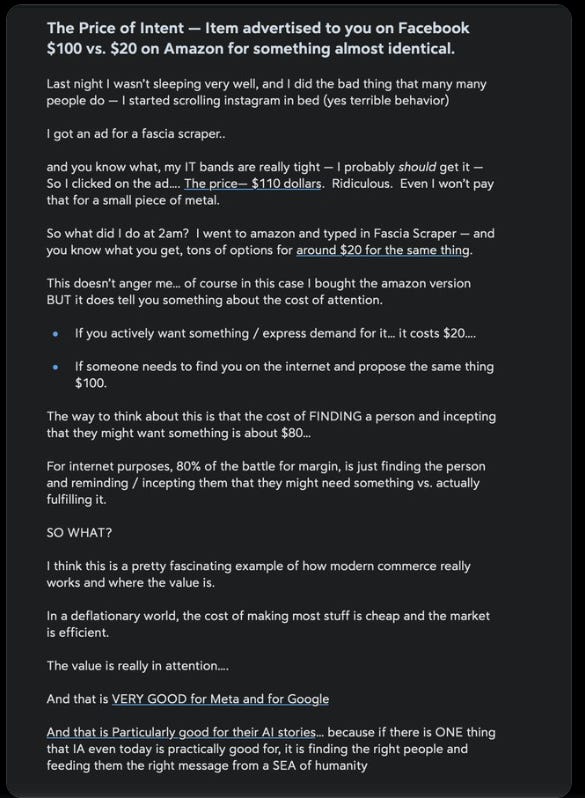And, she's back. Kids are back in school, maroon clothes are all over my feed, and there's a change in the light. And thus, as the wheel turns, my blog is back after the summer holidays.
On that very “seasons of life” note, let's talk about the death of brands, or in the words of Scott Galloway, for "The era of brand, the sun has passed mid-day and Don Draper has been drawn and quartered." Vicious.
Ideas that hit my brain last week - Scott Galloway, Price of Intent, Amazon
Last week three things bubbled up into my various feeds. One, a very short Scott Galloway podcast on the death of the brand, particularly as it relates to paid advertising. Paraphrasing, brand building is over, it's too expensive, we're (as an ad:tech machine) too focused on the end conversion because that's what we can attribute and that just means money in Google/Meta's pocket. Ultimately, he says, if you need that much advertising it's because you don't have good product market fit.
Then, this tweet from Sam Lessin, about the "price of intent," the idea that, for brands, discovery, e.g. organic-feeling promotion, is expensive and the margins have to support that. If you're just searching for a brand-less item on Amazon, the price of the good drops because that marketing spend, both brand and performance, doesn't need to be factored in.
And, lastly, the news that Amazon's app would be native within Insta and TikTok, an evolution so seamless that I have been lured by it repeatedly since launch.
These three ideas made me think, sh*t. Brands ARE dead.
The moment of influence
The consumer purchase funnel so rarely starts with the brand telling someone what to buy. It starts with a human, a media brand, a story, a "moment of influence."
Brands/agencies can lament the changing economics and efficacies of "influencers" (creators? Does it matter? Why is one a dirty word?) but the truth is still that consumers need tastemakers to tell them what to buy. And tastemakers need to monetize that. Was once Vogue, can be Instagram, can be YouTube, can be TikTok. Doesn't matter unless you're the marketing manager paid to optimize the channel, the story is the same. The way to make your brand matter is for it to be lauded/shilled by tastemakers.
Today, it's pretty easy to spin up cheap stuff, to make dupes, to offer your followers access to the dupes you source on Amazon. All of this contributes to the death of the brand. Who cares who made it if it looks cute? And the "influencers" are the people I trust to tell me what looks cute, as I am a human/sheep. That sounds mean, but I know it to be true of myself and it seems to be true for most people. We just want to be told what to buy, in a way that feels "authentic" (ick, I know, but relevant) and somewhere between not-mainstream, because I am unique and cool, but yet also mainstream enough that people KNOW I am unique and cool.
The modern funnel
Moment of influence >> affiliate click >> delivery.
As Galloway said, much of the growth in the last decade, particularly in retail, has been operational. Cough cough the crazy house that Bezos built, now sending at least 7 branded trucks down my street a day. Anything coming from Amazon has an edge. Prime delivery is nice. Other players have made some gains on their own, this is not to say no other retailer has value, but let's call a spade a spade here, as my mother would say.
Why will consumers bother to care about brand, beyond the obvious luxury flexes? I'm being hyperbolic intentionally, but I do think the rise of Temu and Shein has to tell us something about what consumers really value. We've created a vicious, cyclical monster that venerates the "new new" and makes posting the outfit often more important than wearing it. In that scenario, quality does not matter. And I'm now not sure brand does either.
So will we end up in a world of weird consonant driven Amazon brands, XYZZ and SHCTTN dresses and back massagers, dripped to us by "influencers" who have conjured a lifestyle via their reels and Substacks and whatnot that we want to tap into?
And if so, then what?
Edge Cases for Discussion
I've workshopped this idea with various friends in the beauty/fashion/social media businesses and here are the edge cases I'm thinking about:
Celebrity brands, particularly beauty
The role of multi-brand retailers such as Sephora, for whom brick and mortar still plays a pivotal role
Brands whose narrative is so complete that they ARE the tastemakers, the first name that came to mind was Doen (is this Galloway's product-market fit?)
And where does this leave luxury?
I think I'll probably dive into each of these ideas further, to test the limits on this "death of brands idea," so stay tuned.
And if you have any examples of why brands are totally dead or totally alive, let me know.


